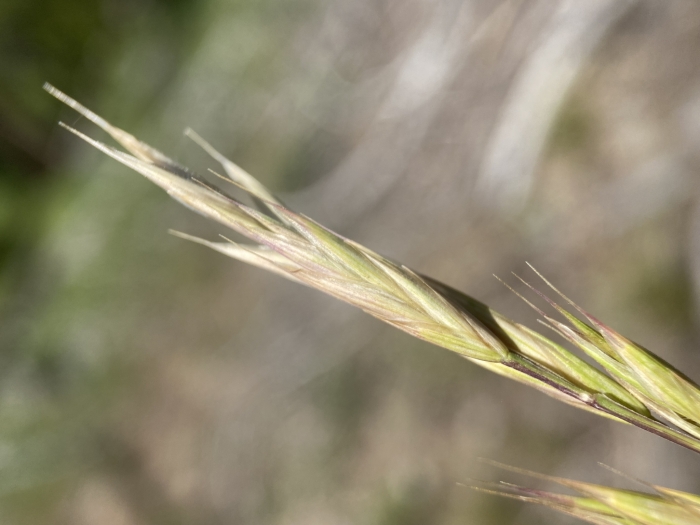Mountain Brome
(Bromus marginatus)
Mountain Brome (Bromus marginatus)
/
/

Matt Berger
CC BY 4.0
Image By:
Matt Berger
Recorded By:
Copyright:
CC BY 4.0
Copyright Notice:
Photo by: Matt Berger | License Type: CC BY 4.0 | License URL: http://creativecommons.org/licenses/by/4.0/ | Rights Holder: Matt Berger | Publisher: iNaturalist | Date Created: 2021-07-14T20:57:04Z |

























Estimated Native Range
Summary
Bromus marginatus, commonly known as Mountain Brome, is a short-lived perennial grass native to various ecosystems including mountain sagebrush, open woodlands, forest edges, and meadows in western North America. It is particularly adapted to subalpine climates and is found from lowland to montane zones. Mountain Brome typically grows 3 to 5 feet tall, with hairy leaves that are notably less than 1 inch wide. The inflorescence is a nodding panicle, with spikelets containing up to 10 flowers each, which are not particularly showy but serve an ecological purpose.
Mountain Brome is valued for its ability to provide forage for grazing animals and its utility in revegetation projects due to its drought tolerance and erosion control capabilities. Its extensive, shallow root network allows it to stabilize soil effectively. In cultivation, it is used for these purposes and can thrive in a range of conditions, including thin, dry soils and partial shade. However, it requires moderate water and can tolerate a variety of soil types, but it prefers well-drained soils. While it can establish easily, care should be taken as it may become weedy and invasive in some areas.CC BY-SA 4.0
Mountain Brome is valued for its ability to provide forage for grazing animals and its utility in revegetation projects due to its drought tolerance and erosion control capabilities. Its extensive, shallow root network allows it to stabilize soil effectively. In cultivation, it is used for these purposes and can thrive in a range of conditions, including thin, dry soils and partial shade. However, it requires moderate water and can tolerate a variety of soil types, but it prefers well-drained soils. While it can establish easily, care should be taken as it may become weedy and invasive in some areas.CC BY-SA 4.0
Plant Description
- Plant Type: Grass
- Height: 1.5-3 feet
- Width: 1-2 feet
- Growth Rate: Rapid
- Flower Color: N/A
- Flowering Season: Spring, Summer, Fall
- Leaf Retention: Deciduous
Growth Requirements
- Sun: Full Sun, Part Shade
- Water: High
- Drainage: Fast, Medium
Common Uses
Bee Garden, Erosion Control, Low Maintenance
Natural Habitat
Native to mountain sagebrush, open woodlands, forest edges, and meadows in western North America, particularly adapted to subalpine climates
Other Names
Common Names: Large Mountain Brome , Brome Grass , Western Bromegrass
Scientific Names: Bromus marginatus , Bromus aleutensis , Bromus breviaristatus , Bromus carinatus var. marginatus , Bromus carinatus var. marginatus , Bromus carinatus var. marginatus , Bromus flodmanii , Bromus hookeri var. marginatus , Bromus latior , Bromus marginatus
GBIF Accepted Name: